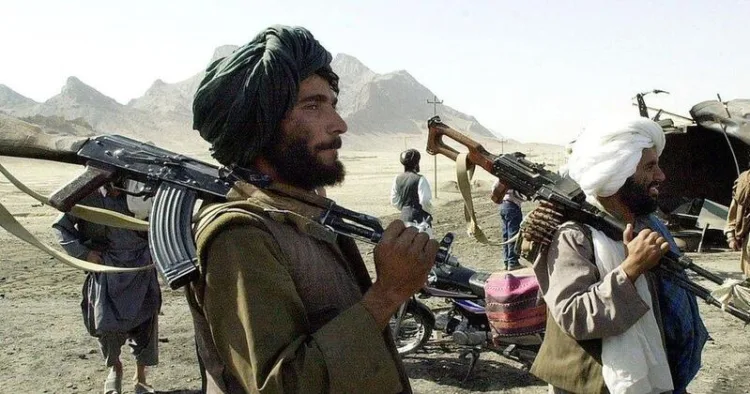The developments in Afghanistan provide Bharat the right opportunity for a geopolitical shift in the region. Pakistan has miscalculated its move by carrying out airstrikes in Afghanistan. While Islamabad would have thought that it would get away with it, the move has instead ignited a fierce fightback by the Taliban.
The experts argue that the strikes that were carried out by Pakistan in Afghanistan’s Paktika province have only led to the unification of the Taliban, Tehreek-e-Taliban (TTP) and the Pashtuns on either side of the Durand Line. Now, all three have a common enemy in Pakistan.
Pakistanis were advised badly
The security planners in Pakistan have clearly given their military bad advice on Afghanistan. The Afghans have fought multiple wars and also inflicted heavy casualties on the Soviet and American forces. Tackling Pakistan would not be too hard for the Afghans, considering the fact that the country is close to Pakistan.
Pakistan has made one mistake after another. The proof of this is that its economy has collapsed, and there is growing political factionalism due to the supporters of Imran Khan. Further, the morale of the troops is low as the TTP has inflicted severe casualties on the security forces. The rising inflation and isolation internationally have also not helped Pakistan’s case. Hence, it was not the best of decisions for Pakistan to strike in Afghanistan.
The idea of the strikes was to overcome all its internal challenges and raise the morale of its troops. It was also meant to create a diversion back home from the real challenges that the country faced. However, all of that went horribly wrong for Islamabad.
Following the air strikes, the Afghans woke up and mobilised a force of battle-hardened guerrilla warriors numbering 15,000. Further, the Taliban has also armed itself with weapons that were left behind by the United States following its hasty withdrawal in 2021.
The Taliban, along with the TTP and Pashtuns, have launched attacks on Pakistani forces stationed at the Durand Line. The statement by the Taliban’s Ministry of Defence following the retaliatory strikes is very telling. It said that the Taliban had targeted sites which were serving as centres and hideouts for malicious elements and their supporters who organised the strikes against Afghanistan. A reference to the Pakistan Army as a malicious element in itself is very telling.
What is ahead for Bharat
Bharat has maintained a presence in Afghanistan through its humanitarian efforts. There have been several back-channel talks between officials in the two nations. While New Delhi is committed to providing humanitarian assistance, it has also convinced Afghanistan not to allow its soil to be used to launch terror attacks on India. When talks of terror are held with Afghanistan, then there would definitely be a mention of Pakistan, which is known to harbour terrorists.
Bharat’s overtures in Afghanistan are clear from the fact that Afghanistan has not allowed the Pakistan terrorists to use its soil as a launch pad against India.
Bharat has a lot to gain in the current scenario. The fact that New Delhi has a presence in Afghanistan is in itself a welcome sign. Now is the right time for New Delhi to leverage the situation, considering the geopolitical implications it would have in the region. The failing ties between Pakistan and the Taliban and also the shift in dynamics all work well for Bharat.
Now would be the time for New Delhi to engage more strongly with Kabul since the country is facing threats from multiple fronts. While the TTP and Taliban may stand united, it still faces a major threat from the Islamic State Khorasan Province. Engaging with Kabul would also send a strong signal to the Islamic State, which has its focus on Bharat and intends to carry out multiple terror attacks.
Earlier this year, an Indian delegation took part in the Regional Cooperation Initiative meeting in Kabul under the leadership of the Taliban. The Ministry of External Affairs reiterated Bharat’s relation with the Afghan people and said that the Indian diplomats have been engaging with the Taliban in various formats.
The MEA said that New Delhi has been attending several meetings in Afghanistan in various formats, both at the digital and international levels. The MEA also spoke about the long-standing friendship with the Afghan people and the humanitarian assistance that New Delhi is carrying out in Afghanistan.
Ties fall to an all-time low
Since April 2022, Pakistan has carried out three airstrikes on different locations in Afghanistan. This had resulted in hundreds of deaths of civilians. However, this time around, Afghanistan has taken a very aggressive stand and decided to retaliate hard.
The reason why the former allies are today at loggerheads is that there have been several incidents in which the Pashtun community and Afghan refugees living in Pakistan have been targeted. Pakistan also carried out a mass deportation programme in 2023 in which hundreds of thousands of Afghan refugees were sent back to Afghanistan forcibly. The Pakistani forces are said to have misbehaved with the women during this programme.
While the relations were already tense, the airstrikes only made it worse since it was seen as an aggression against the Pashtun community. With the Taliban trying to present itself as the legitimate government in Afghanistan, such strikes have a bad effect on its image. The Taliban wants to project a strong image to the people of Afghanistan and send a message that it will not be undermined by such strikes. This is the reason why the aggression against the airstrikes is so intense.



















Comments